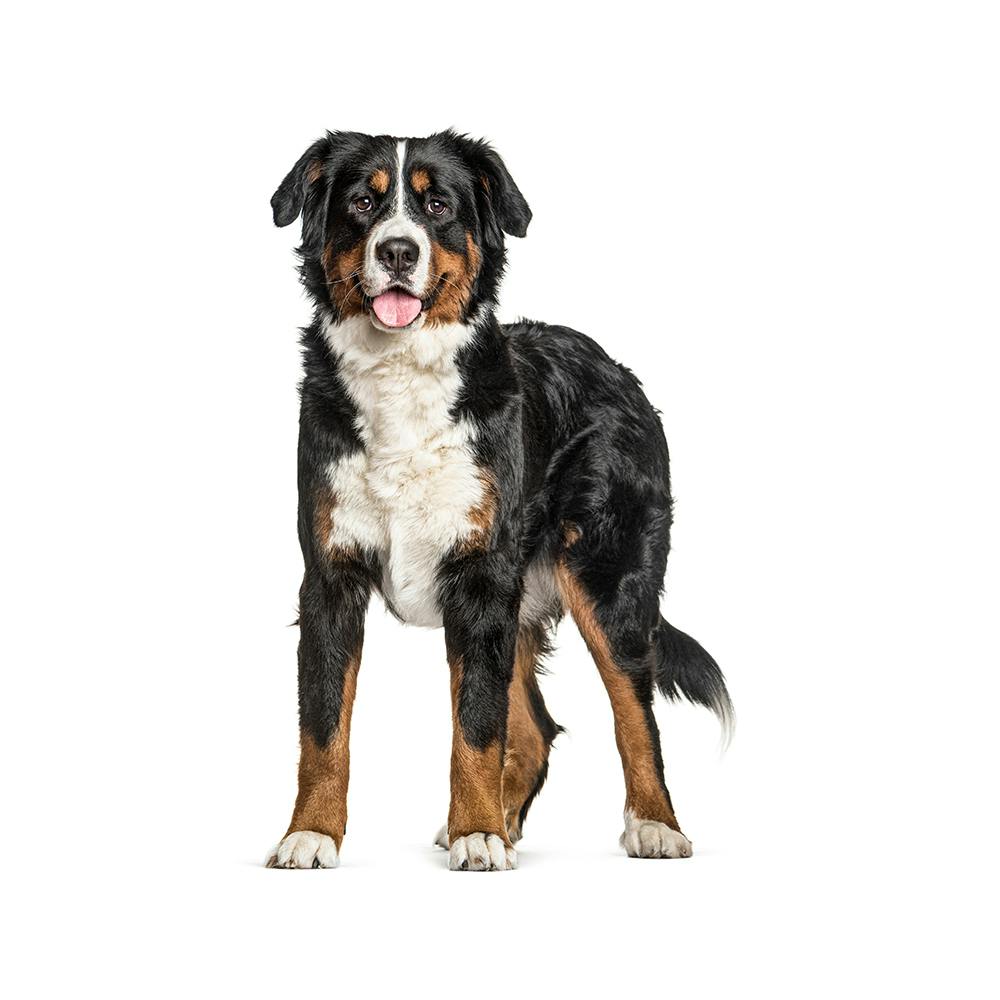
Bernese Mountain Dog
The Bernese Mountain Dog, also known as the Berner Sennenhund in its native Switzerland, is one of four types of Swiss Mountain Dogs and the only one with long hair. The breed's origins can be traced back over 2,000 years to when the Romans brought mastiff-type dogs to Switzerland, where they were used as working dogs on farms, for guarding property, and driving dairy cattle long distances from the farm to the alpine pastures. They got their name from the Canton of Bern in Switzerland where they were widely used.
- Origin
- Switzerland
- Alternate Names
- Berner, Berner Sennenhund
- Life Expectancy
- 7-10 years
- Average Male Height
- 25-27.5 inches
- Average Female Height
- 23-26 inches
- Average Male Weight
- 80-115 pounds
- Average Female Weight
- 70-95 pounds
- Coat Length
- Medium
- Coat Type
- Double
- Coat Colors
- Black & Rust, Black & White, Black Rust & White, Black Tan & White, Rust & White
- Coat Pattern
- None
Genetic Predispositions and Health
Bernese Mountain Dogs, often called Berners, can be affected by a range of health conditions. These include Alexander disease, aseptic meningitis, atopic dermatitis, borrelia susceptibility, cataracts, cerebellar abiotrophy, cervical vertebral instability, cleft palate, color dilution alopecia, Cruciate ligament disease, degenerative myelopathy, dysmyelinogenesis, elbow dysplasia, elbow dysplasia (ununited anconeal process), elbow dysplasia (fragmented coronoid process), entropion, epilepsy, Factor I (fibrinogen) deficiency, Factor VII deficiency, gastric dilation/volvulus, glomerulonephritis (membranoproliferative), hepatocerebellar degeneration, hernia (umbilical), hip dysplasia, histiocytosis, hypertrophic steodystrophy, hypoadrenocorticism, hypomyelination, hypothyroidism, immune-mediated polyarthritis, leptospirosis susceptibility, leukodystrophy(fibrinoid), lymphoma, mast cell tumor, meningitis (aseptic), osteochondritis dissecans (shoulder), panosteitis, patellar luxation, persistent pupillary membranes, portosystemic shunts, progressive retinal atrophy, protein-losing nephropathy, renal dysplasia, sebaceous adenitis, vasculitis, and von Willebrand disease (Type I).
Personality and Behavior
Bernese Mountain Dogs are known for their gentle and friendly nature. They are excellent with children and they get along well with other pets. They are intelligent, easy to train, and they thrive on attention and being part of the family activities.
Despite their large size, they are generally calm and patient, traits that endear them to families. However, they do require regular exercise to stay healthy and happy. Because they were bred for work, they enjoy tasks and challenges, making them great candidates for obedience, tracking, and herding trials.
Socialization from an early age is essential for Bernese Mountain Dogs, as they can be aloof with strangers and have a tendency to be overprotective if not properly socialized.
Fun Facts
In the canton of Berne, Switzerland, Bernese Mountain Dogs primarily worked as drivers of cattle and sheep, and as watchdogs in farmyards.
The breed was officially recognized by the American Kennel Club in 1937, but it was not until the 1960s that they started to become more popular in the United States.